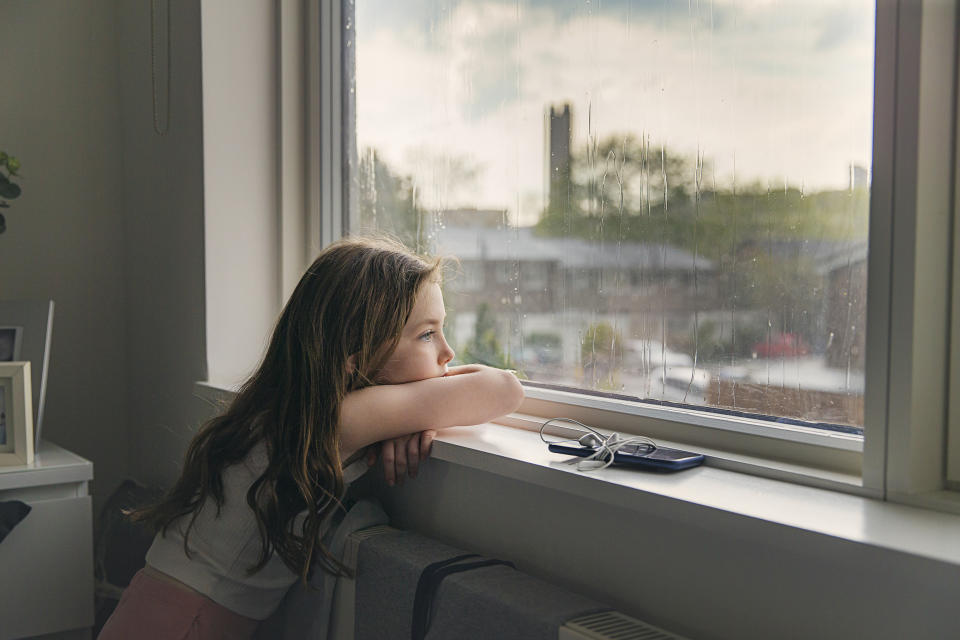Feeling stressed? Now’s the time to take extra care of your mental health
May is Mental Health Awareness month, and while the important occasion is coming to an end this weekend, it's important to remember that the resources and help so publicized during the month are available year-round.
Here's what you need to know about Mental Health Awareness month, what resources are available, and some advice on how to take control of your mental health during the coronavirus pandemic.
What is Mental Health Awareness month?
The goal of Mental Health Awareness month is to reduce the stigma and give people a platform to talk about their experiences with mental health.

"Mental Health Awareness month is one essential part of decreasing the stigma associated with mental health challenges," said Amanda Spray, PhD, a clinical psychologist and the clinic director of the Steven A. Cohen Military Family Center at NYU Langone Health. "It provides an opportunity for people to share their experiences and validate the experiences of others, to normalize that this can be part of the human experience, and you're not alone."
Lynn Bufka, PhD, senior director for practice and research policy at the American Psychological Association, said that a major goal of the month is to encourage people to treat their mental health just as seriously as they treat physical health.
"Really, you can't separate our mental health from our physical health and overall well-being, but so often it does get separated and ignored," said Bufka. "...We treat our mental and emotional health as something distinct from our overall physical well-being."
Paul Gionfriddo, the president and CEO of Mental Health America, added that Mental Health Awareness month isn't just for people who have a diagnosed mental illness.
Related: 9 things children need from caregivers to survive the crisis
"Its purpose today is more to both celebrate mental health and speak to the broad audience of everybody who is concerned about their own mental health," said Gionfriddo.
During the month, professionals in the field are also encouraged to share resources and information.
"I think it encourages professionals to also get outside of their offices, maybe not literally right now, but to get on social media get on on blogs and really provide information about mental health, and the treatments that are available," Spray added.
What are some of the best ways to find reliable resources year-round?
Even once May draws to an end, it's important to know that there are more resources than ever constantly accessible. Many mental health organizations have their own toolkits and other information available online, but even a quick Google search can help you find at-home resources.
"You know the virtual environment is full of really useful stuff now and it's free," said Gionfriddo. "You know freely available, it's all downloadable, people could use it, they can share it. So I highly recommend that because it's easy, it's inexpensive, and you can do it from home."

Bufka pointed out that with more therapists than ever doing telemedicine and speaking with patients over the phone or video calls, it's easier than ever to find an accessible therapist. If you do seek care online, she recommends confirming that the physician you are seeing is licensed in your area, and make sure that they treat the things you want to talk to them about.
"One thing that I really encourage people to think about is you're the consumer, you're purchasing this care so to speak, so you should have a little agency in trying to find what you think is going to be helpful for you," she said. "You are trying to find somebody who's got the skills and expertise to address the concerns that you have ... It's very reasonable to ask questions, because if you're going to enter therapy you're entering a relationship with that person and you're really hoping to have a good match."
Related: How talking to a professional could help you deal with the pandemic’s effects on your mental health.
There are also crisis resources available for people in more immediate need. A free national crisis hotline is available at 1-800-273-TALK, and Spray said that anyone who believes they may be a danger to themselves or others should immediately call 911 or go to the nearest emergency room.
What extra care should you take with your mental health during the COVID-19 pandemic?
During times of increased stress, it's important to take extra care of your mental health, and multiple experts warned that the pandemic would be an extremely stressful time for many.
"Given all of these different stressors that everybody is experiencing, it could easily exacerbate symptoms that one may have had in the past," said Spray, citing concerns like grief and loss, isolation, and the need for people to fill multiple roles that they may not have had to fill in the past (such as parents serving as teachers for children).

Anecdotally, those in the field are already seeing an increase in requests for help.
GIonfriddo said that his organization's mental health screening tools, which can be used anonymously and can help point people towards resources they might want, have seen a huge increase, now being used by "somewhere around 6,000 people per day" during the month of May.
"It's important that we take the guesswork out of this, and important people can do it in the privacy of their own homes," he said.
Meanwhile, at the National Alliance on Mental Illness, Daniel Gillison, CEO of the organization said that an online educational tool for parents looking to support their children who are showing symptoms of mental illness has increased in use by 580% in the past few months. Calls to their crisis helpline have increased by 65%.
Experts in the field said that during this time it's important to be compassionate and gentle on yourself, but keep an eye out for any alarming symptoms or changes in behavior, thought patterns, or other daily routines.

